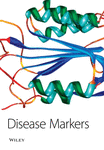Matrix Metalloproteinases 2 and 3 Gene Polymorphisms and the Risk of Target Vessel Revascularization after Percutaneous Coronary Intervention: Is There Still Room for Determining Genetic Variation of MMPs for Assessment of an Increased Risk of Restenosis?
Abstract
Objective: Mixed results have been reported of matrix metalloproteinases (MMP) and their association with restenosis after percutaneous coronary intervention (PCI). The current study examines whether multiple single nucleotide polymorphisms (SNPs), covering the full genomic region of MMP2 and MMP3, were associated with restenosis in the GENDER study population.
Methods and results: The GENetic DEterminants of Restenosis (GENDER) study enrolled 3104 consecutive patients after successful PCI. The primary endpoint was clinical restenosis, defined as target vessel revascularization (TVR), occurring in 9.8% of the patients. From the Hapmap database, 19 polymorphisms of MMP2 and 11 of MMP3 were selected. Furthermore, in a subpopulation, a genome-wide association analysis (GWA) was performed. No significant association was found with any of the investigated SNPs, including the previously reported 5A/6A polymorphism (rs3025058), with regard to TVR using single SNP analysis or haplotype analysis.
Conclusion: We found no significant association of MMP2 or MMP3 with TVR with this SNP-broad gene approach. Although we did not test all the known polymorphisms of these genes, using tagging analyses we examined those SNPs covering all known haplotypes of MMP2 and MMP3 to conclude that these genes do not correlate with a genetic risk of coronary restenosis after successful PCI.




